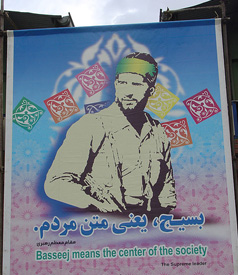On Monday, February 15, American Secretary of State Hillary Clinton characterized the Iranian regime as a virtual military dictatorship. Although Mrs. Clinton, an accomplished Yale graduate, often takes on a professorial tone, Monday she was not indulging in an academic exercise on the typology of political regimes. She was speaking in Qatar, a Persian-Arabian Gulf emirate which maintains close ties with Iran. She was but a few cable lengths away from the Islamic Republic. She was delivering a warning: the United States and their allies will be imposing a sanctions regime against Iran, specifically targeting the Guardians of the Revolution.
They are a Praetorian Guard of 125,000 men – composed of land, air, and naval forces, without even counting the network of militias – formed immediately after the 1979 revolution to protect the Islamic regime. According to Mrs. Clinton, its leaders are in charge of the Iranian nuclear program which no expert doubts is violating the commitments undertaken by Tehran and may have military objectives.
From the first election of Mahmoud Ahmadinejad – who was one of their own – to the presidency in 2005, the Guardians have continued to rise in power. They are not solely a military force. They are also an economic force: they control a good part of the country’s economic activity. They’re a social force: they distribute a part of oil rents. They’re a police force through their militias.
Along with Mr. Ahmadinejad, they have marginalized the traditional clergy. Then, with the June 2009 semi-putsch, when Mr. Ahmadinejad proclaimed his victory the day after a contested election, they have shattered the systems of checks and balances that characterized the Islamic Republic. In short, these fifty-year-olds, formed during the war against Iraq (1980-1988) when Iran was alone and weak, have militarized, and, in a certain way, secularized, the regime.
A military-theocratic circle, the leaders of the Guardians have an ideology that French expert Frédéric Tellier characterizes as populo-islamist or islamo-fascist: “a mixture of political romanticism, technical rationality, cold fanaticism, and unconditional devotion.” Hypernationalists, they are poised to transform the hybrid that the Islamic regime once was into a pure and simple military dictatorship.
But they are undoubtedly divided, and their military/police intervention arouses the anger of many Iranians. In short, they have not yet succeeded.
Translation: Truthout French Language Editor Leslie Thatcher.
Join us in defending the truth before it’s too late
The future of independent journalism is uncertain, and the consequences of losing it are too grave to ignore. To ensure Truthout remains safe, strong, and free, we need to raise $24,000 by the end of today. Every dollar raised goes directly toward the costs of producing news you can trust.
Please give what you can — because by supporting us with a tax-deductible donation, you’re not just preserving a source of news, you’re helping to safeguard what’s left of our democracy.
